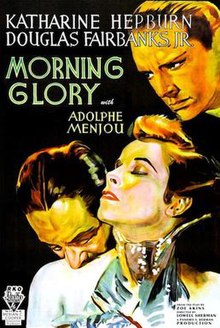Morning Glory (1933 film)
| Morning Glory | |
|---|---|

Original US cinema poster
|
|
| Directed by | Lowell Sherman |
| Produced by | Pandro S. Berman |
| Screenplay by | Howard J. Green |
| Based on |
Morning Glory (play) by Zoë Akins |
| Starring |
Katharine Hepburn Douglas Fairbanks, Jr. Adolphe Menjou |
| Music by | Max Steiner |
| Cinematography | Bert Glennon |
| Edited by | William Hamilton |
|
Production
company |
|
| Distributed by | RKO Radio Pictures (US) |
|
Release date
|
|
|
Running time
|
70 minutes |
| Country | United States |
| Language | English |
| Budget | $239,000 |
| Box office | $582,000 |
Morning Glory is a 1933 Pre-Code American drama film which tells the story of an eager would-be actress and her journey to stardom, and what she loses as a result. The picture stars Katharine Hepburn, Douglas Fairbanks, Jr., and Adolphe Menjou, was adapted by Howard J. Green from a then not yet stage produced play with the same name by Zoë Akins, and was directed by Lowell Sherman. Hepburn won her first Academy Award for Best Actress for this movie. Morning Glory was remade in 1958 under the title Stage Struck.
Eva Lovelace (Katharine Hepburn) is a performer from a small town who has hoped since childhood to make it big on Broadway. She goes to auditions and tries to get a role in an upcoming play that would help her make it to the big time. While there, one other actress auditioning makes the cut as she is under contract with the company, but in fact the boss would love to get rid of this pest of a woman. A theatre coach (C Aubrey Smith), whom she meets while waiting to talk to Louis Easton (Adolphe Menjou), agrees to give her acting lessons.
She later meets Joseph Sheridan (Douglas Fairbanks Jr.), who agrees to give her a small part in an upcoming Broadway play. As the play is about to begin, the star of the show Rita Vernon (Mary Duncan), a blonde theatre star under contract with Easton, starts making demands for money in a contract she wants. When she is not obliged, she storms off the set and the show is without a star. The production crew frantically tries to find a replacement. As a last resort, they choose Eva Lovelace to play the star of the show and she gets her big break. She quickly rehearses her lines and makes an excellent debut as a star but the road is rocky and the film ends on a far from happy note.
...
Wikipedia
